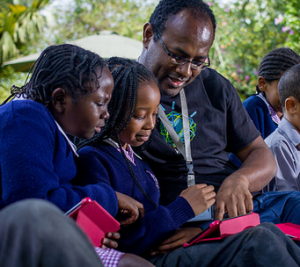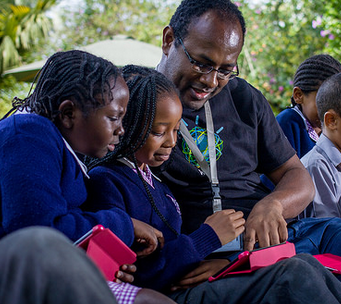Launch project in Mombasa County, Kenya using technology to improve understanding of educational challenges in schools
RTI International (http://www.rti.org) – a leading nonprofit research institute – and IBM’s (NYSE: IBM) Africa research lab  (http://www.research.ibm.com/labs/africa) have announced a partnership to deploy big data analytics and cognitive technologies to help transform development approaches in Africa and around the world. In one of the first projects, IBM and RTI are developing and testing intelligent systems to capture data about schools in Mombasa County, Kenya.
(http://www.research.ibm.com/labs/africa) have announced a partnership to deploy big data analytics and cognitive technologies to help transform development approaches in Africa and around the world. In one of the first projects, IBM and RTI are developing and testing intelligent systems to capture data about schools in Mombasa County, Kenya.
Through the partnership, RTI and IBM Research – Africa will explore ways of using advanced technologies to capture accurate data about challenges in areas such as healthcare, agriculture, water and education. Drawing on the power of big data analytics, researchers will provide insight to governments, aid agencies and other organizations who are looking to make more informed decisions about investment and development while having greater visibility of results.
“A dearth of data on Africa in the past has led to misunderstandings or misrepresentations of the continent’s history, economic performance and potential. Over the past few decades, even simple facts have been misrepresented – the size of a country, its economic performance, the amount of poor people, the volume of exploitable resources,” said Dr. Kamal Bhattacharya (http://www.apo.af/H4zBuh), Vice President IBM Research – Africa. “The latest advances in mobile, big data and Internet of Things technologies have the potential to change that so that we have an accurate and dynamic understanding of Africa’s challenges, rising opportunities and incredible potential.”
The partnership comes as a rapid rise in mobile and Internet of Things technologies are producing unprecedented amounts of data. In developing countries, mobile phones, digital devices and low-cost sensors connected to improving cellular networks are reaching previously disconnected communities with the potential to produce new insight about how people live and the challenges they face.
“Rapid advancements in technology and open data initiatives mean more data is available now than ever before, offering significantly greater insights to improve lives through smarter development programs,” said Aaron Williams (http://www.apo.af/k4Eob4), executive vice president at RTI. “By combining our expertise in data science and development, RTI and IBM will apply the information newly at our fingertips to accelerate improvements in literacy, respond rapidly to the spread of infectious diseases, and discover and apply new innovations for improving the human condition in the developing world.”
Big Data for Education in Mombasa County
In one of the first joint projects, RTI and IBM are developing and testing intelligent systems for data capture and decision support to improve accountability and transparency in more than 100 schools in Mombasa County, Kenya. The project is designed to support the Kenyan Ministry of Education Science and Technology data collection initiative.
Teachers, head teachers, school principals and administrators will be equipped with tablet devices to capture data about students, classrooms, and school resources. IBM and RTI scientists will use big data analytics and cognitive technologies to analyze the data and provide indicators that establish school profiles and progress and provide actionable recommendations about the county’s education system at a granular level. The activity is part of the United States Agency for International Development’s Education Data for Decision Making (EdData II) project.
“In the past, head teachers, government officials and aid agencies across Sub-Saharan Africa have struggled to make informed decisions about how to invest in and improve education,” said Dr. Kommy Weldemariam (http://www.apo.af/9QGTiv), Research Scientist, IBM Research – Africa. “Often education data is incomplete, inaccurate and sometimes even deliberately misreported. Using analytics and cognitive technologies, we are creating a school census hub which will minimize the effort, expense and error in collecting valuable data about attendance, performance and resources at schools. It has the potential to completely change our understanding of the situation on the ground and what needs to be done to improve it and improve the outcomes for children.”
Achieving Sustainable Development Goals
Applying insights and actionable evidence from data will be key to achieving the Sustainable Development Goals, ambitious universal targets that will be confirmed by a United Nations Summit in September 2015. They include ending poverty and hunger, ensuring healthy lives and ensuring inclusive and equitable quality education.
“By adding analytical value and insight to data production, curation and integration, RTI and IBM will help lay the paving stones for the ‘data revolution for development’ to lead the way in achieving the sustainable development goals,” said Dr. Luis Crouch (http://www.apo.af/BHpam6), vice president and chief technical officer in RTI’s International Development Group, who has worked with various UN processes on the formation of these goals.
The sustainable development goals raise numerous global challenges for which innovative data science solutions, such as predictive analytics, sifting of massive amounts of evidence, and more agile use of citizen-sourced information and citizen feedback could help provide solutions. For instance, in the education sector, initiatives can provide insight on building early childhood development programs that predicate success in later education and life; design early grade reading and math programs using the best instructional approaches and curricula; and inform policymakers on policies needed to support sustainable improvements in education and the data systems needed to track progress in systemic reform. In the health sector, initiatives can help track the spread of infectious diseases faster and more efficiently; provide a better understanding of the underlying causes of non-communicable diseases such as diabetes, heart disease and cancer; and improve the knowledge management, oversight and accountability needed to strengthen health systems.









